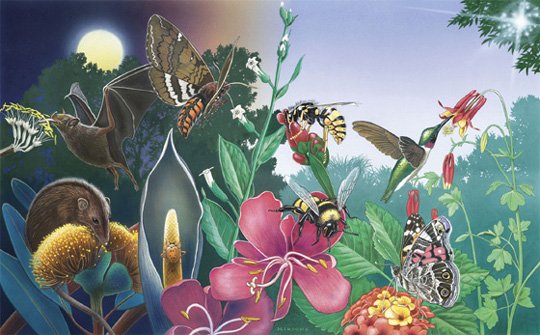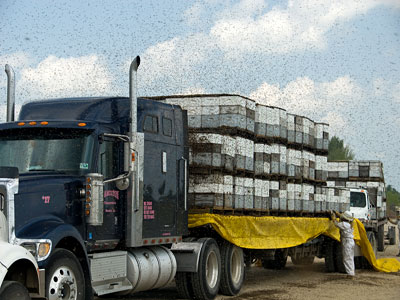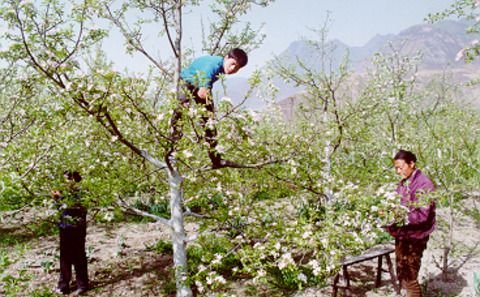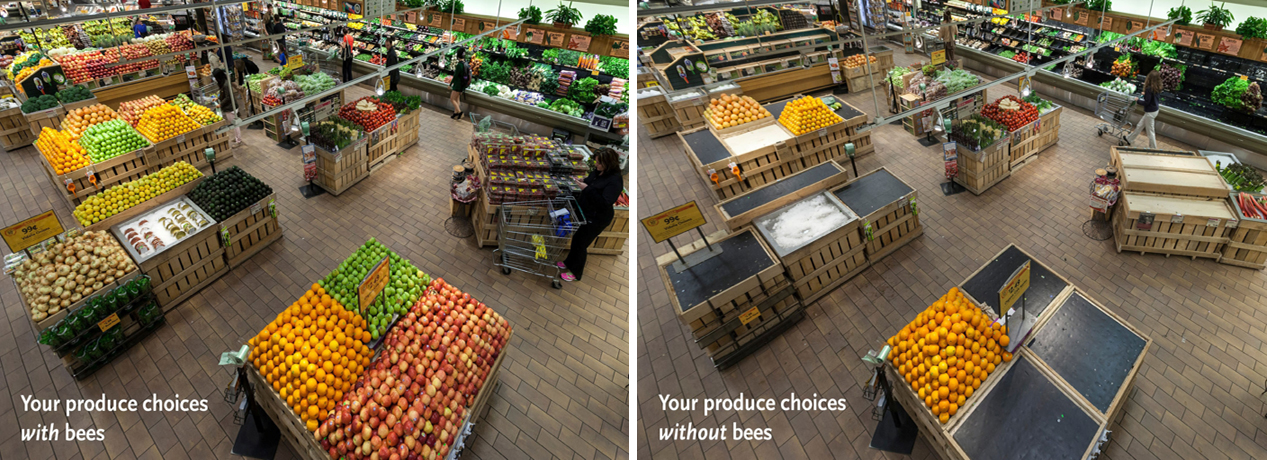Beekeeping For Everyone! - #2 - The Importance of Pollinators
Most people don't understand how much of our food requires pollination and the importance of the pollinators. Pollination is required for the production of most fruit and vegetables. There are a few vegetables that are wind pollinated, such as corn and spinach, and some that don't need to be pollinated like kale and carrots. But, over 75% of all flowering plants are pollinated by animals.1
The image below shows the difference between proper pollination and poor pollination.

image credit: UC Berkeley
Who are the Pollinators?
Many animals play a part in the symbiotic relationship with plants, including:
- ants
- bats
- bees
- beetles
- birds
- butterflies
- flies
- moths
- wasps
There are even some large animal pollinators such as lemurs, honey possums and geckos.

image credit: USDA Forest Service
Why is the honeybee so important?
All pollinators are important, but the honeybee has become increasingly important because of the changes in our agriculture methods. The honeybee is the only pollinator that can be managed in large quantities to meet the needs of our large monocrop operations. One can argue it is also the reason the honeybees are facing so many issues, but we will save that for a future discussion.

image credit: Bee Culture
None of the other pollinators exist in large social colony that can be managed by humans to meet the pollination needs of these large monocrops. Many of these pollinators are better adapted to pollinate than the honeybee. For example, the bumblebee has a longer tongue and can get into flowers that honeybees can't. Bumblebees also can fly at a lower temperature than honeybees, so there are days in early spring that bumblebees will be pollinating and the honeybees aren't.
Another interesting difference between honeybees and bumblebees is that honeybees are mono-floral, meaning they will only collect nectar and pollen from one plant species at a time. While the bumblebee is poly-floral, meaning it will collect from any species of plant at anytime. You can often watch a bumblebee in your garden going back and forth between different plants. This trait may seem well suited for our mono-crop agriculture, but it has the possibility of being problematic as well. Take early spring when dandelions are in bloom and apple trees start blooming. The orchard owners pays to have honeybees bought into his orchard for a few weeks during that critical time when pollination is required for the trees to bear fruit. If there is a high population of dandelions in the orchard, there is the possibility that the honeybees will work the dandelions and ignore the apple trees. Without pollination the orchard will not produce a profitable crop. This often leads to mass usage of weed killers.
How Does it Affect You?
One in three bites of the food you eat is the result of insect pollination2. Just take a minute to let that sink in.......
South west China has already seen a drastic decline in wild bees due to excessive pesticide use and a lack of natural habitat. This has forced farmers to hand-pollinate their apple and pear trees. This may be possible for high value crops, but there are not enough humans in the world to pollinate all of our crops by hand.

image credit: chinadialogue.net
Neither plant nor pollinator populations can exist in isolation – should one disappear, the other is one generation away from it's demise.
Hopefully you are now better aware of the importance of the honeybee and all pollinators. Our future depends on them and it appears their future depends on us to change our ways.
I'll close with a photo from Whole Foods that visually tells the story of what is in store if we don't support the wellbeing of the honeybee.

image credit: Whole Foods
Interested in Beekeeping?
Follow me (@bushkill) so you don't miss the next post in the Beekeeping for Everyone! series
Check out the previous post in the Beekeeping for Everyone! series Beekeeping For Everyone! - Introduction
Also check out these favorites:
Why You Should NEVER EVER Kill Honeybees Living in Your House
The Mysteries of a Bee Beard Revealed!!
citations
1 - U.S. Fish & Wildlife Services
2 - Bee Better Certified
Beekeep On!
![]()
@bushkill
My father work is to make bio vegies (jardinparis.com) we not taking online order anymore. But just to say that i'm really concerned and I love your post!
thank you and best of luck to your dad.
This is such an important issue, which is fetching such an incredibly underwhelming response.
Great piece of content. Following you for more #homesteading inspiration!
Thanks, I'm hoping with persistence I can continue to help people understand the importance.
Excellent post!
I know the essentialness of bees; and, wish people would storm the streets for this cause instead of....whatever the reasons for the recent protests.
While I realize their importance, I am also reminded of how territorial they can be. A few years ago, I was just entering the house and saw a whole swarm of bees attach a 'hive' to a tree within minutes.
These may have been a swarm of the Africanized, aka, killer bees. Fortunately, a quick search for beekeepers found me a very calm person who arrived within the hour.
It was fascinating to watch him fully-geared remove the bees. After a small fee for the work he did, only a few remained. He said they'd swarm for a few more hours and move on. They did.
That was an unnerving and energizing experience, with a newfound respect for this many-purposed insect.
Again, thanks for this interesting post. I learned more than a bit!
Peace.
Yes swarming of bees can be a very exciting and intimidating event at first. Most folks associate honeybees with wasp and hornets and assume they will attack. Once you understand that they are 'homeless' and their energy is set on finding a new home it can be quite relaxing to experience. It takes almost a month for a swarm to raise new bees by the time they find a new home, build comb for the queen to lay and then for the eggs to grow, pupate, and hatch. Bees only live 4-6 weeks, so a swarm does not have much time to waste. They have also gorged themselves on honey to get their wax glands flowing so they can immediately start building comb. When they are gorged, they are like we are when we eat way too much, just want to be left alone and not interested in confrontations.
W-O-W!
I will take your word on this ;+)!!! It probably explains why yard crews give them their space. I've heard news stories where some of these so needed insects will chase those who interfere with their objective.
I'm reminded that as the beekeeper brought the hive back to his farm, I couldn't help but remember how close I came to asking for a free jar of local honey. I'm sure he would have accomodated; but, I was too shaken to do more than make the payment and thank him for his help.
Btw, I only saw a couple of bees this past summer when I grew my first ever tomatoes of several kinds. I soon observed that dragonflies, and a few very small insects showed up every day to tend to the flowers. I learned so much, just as I did with your post.
Again, thanks for sharing!
Peace.
Very important information information.. @healthy-home has a curative blog you may be interested in joining!
thanks for the tip, I'll look into it
Thank you for contributing your knowledge to help others! Sotall.org Knowledge Directory of Steemit Posts has linked to this post. You can see your link here.
I just discovered the curation lounge on the Discord and I'm in love and this post is amazing.
Thanks, glad you found it.
This is really interesting and helpulful information. Waiting for more
Thanks, stay tuned much more to come.
Excellent post from Bee keeping specialist. Enjoy your success.
@stevenmosoes
thank you
Every creation as it purpose and we must respect that. Pollination helps the community to grow also. Due to the production of foods/vegetables.
hope we can save these pollinators.
@seyiodus.
Proverbs 24:13 - My son, eat honey, for it is good, Yes, the honey from the comb is sweet to your taste;
I have a friend that used to own a bee hive, and he told me about this too, most people don't know anything about this, great post!
True, it amazes me how people have been 'taught' to associate honeybees with wasps and hornets.